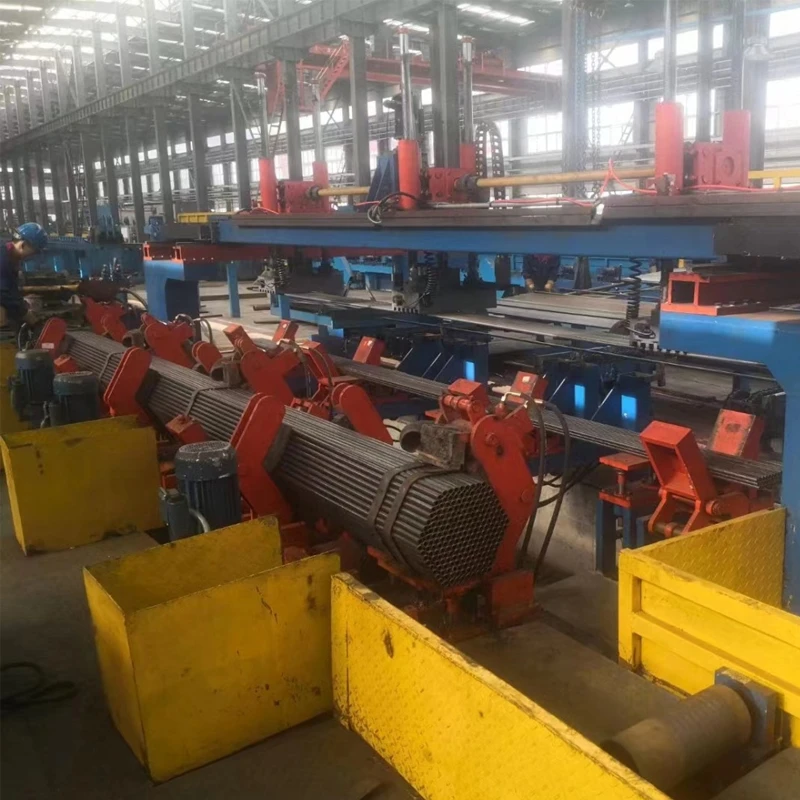Steel Pipe Production Equipment for Efficient Manufacturing Processes
The Steel Pipe Making Machine Revolutionizing the Industry
The steel pipe making machine is an essential piece of equipment in the manufacturing sector, particularly in the production of seamless and welded steel pipes. As industries evolve, the demand for high-quality steel pipes in various applications—from construction to plumbing—has surged. Steel pipe making machines have thus become pivotal in meeting this demand efficiently and effectively.
Overview of Steel Pipe Making Machines
Steel pipe making machines are designed to produce pipes from steel strips or coils. The manufacturing process involves several stages, including decoiling, forming, welding, and finishing. The machine's efficiency and precision directly impact the quality of the final product. Advanced technology and automation have enabled manufacturers to enhance production speeds, reduce material wastage, and ensure consistent quality.
Key Components of Steel Pipe Making Machines
1. Decoiler This component unwinds the steel coil, preparing it for the forming process. A well-functioning decoiler is crucial, as it must handle heavy coils without damaging the steel.
2. Forming Stands These are where the flat steel strips begin to take shape. Various forming stands, often equipped with rollers, gradually transform the flat strip into a cylindrical shape.
3. Welding Unit One of the most critical stages in the manufacture of welded pipes is the welding process. The welding unit uses high-frequency induction or submerged arc welding to join the edges of the steel strip. This stage requires precision to ensure a strong and durable seam.
4. Sizing Section After welding, the pipe enters the sizing section, where it is resized to the required diameter and thickness. This step ensures that the pipes meet specific industry standards.
5. Cutting Machine Once the desired length is achieved, the cutting machine precisely cuts the pipe into manageable lengths. These can then be bundled for shipping or further processed.
6. Finishing Unit The final stage involves finishing processes such as deburring, cleaning, or coating the pipes for corrosion resistance. This is crucial for pipes intended for applications in harsh environments.
Advantages of Modern Steel Pipe Making Machines
steel pipe making machine

Modern steel pipe making machines offer several advantages over traditional methods
- Higher Efficiency Automated systems reduce labor costs and increase production speed. With advanced software and controls, manufacturers can operate these machines more efficiently than ever before.
- Quality Control With built-in monitoring systems, manufacturers can maintain high standards of quality, detecting defects early in the production process. This focus on quality minimizes waste and increases customer satisfaction.
- Flexibility Today's machines can produce a wide range of pipe sizes and types, adapting quickly to changing market demands. This versatility allows manufacturers to respond to customer needs quickly.
- Environmental Considerations Many modern machines are designed with energy efficiency in mind, using less power and producing less waste. This focus on sustainability not only benefits the environment but also reduces operational costs.
Applications of Steel Pipes
Steel pipes produced using these machines find applications in various industries
- Construction Used for structural purposes, water supply, and drainage systems. - Oil and Gas Essential for transporting hydrocarbons from extraction sites to refineries and distribution terminals. - Automotive Used in the production of exhaust systems and various automotive components. - Infrastructure Steel pipes are critical in building utilities, roads, and bridges.
The Future of Steel Pipe Making Machines
As the demand for high-quality steel pipes continues to rise, the future of steel pipe making machines looks promising. Innovation will play a key role, with advancements in automation, artificial intelligence, and material science driving productivity and quality to new heights.
In summary, the steel pipe making machine is a cornerstone of modern manufacturing, combining technology and engineering to produce critical components for various industries. As manufacturers continue to adapt and innovate, the capabilities of these machines will only grow, ensuring the longevity and relevance of steel pipes in an ever-changing industrial landscape.
-
High Frequency Straight Seam Welded Pipe Production Line-BzZhou Xinghua Machinery Equipment Manufacturing Co., LTD.|Precision Welding, High EfficiencyNewsJul.30,2025
-
High Frequency Straight Seam Welded Pipe Production Line|BzZhou Xinghua|Precision Welding&EfficiencyNewsJul.30,2025
-
High Frequency Straight Seam Welded Pipe Production Line - BzZhou Xinghua|Precision Engineering&EfficiencyNewsJul.30,2025
-
High-Frequency Straight Seam Welded Pipe Production Line-BzZhou Xinghua Machinery Equipment Manufacturing Co., LTD.NewsJul.30,2025
-
High-Frequency Straight Seam Welded Pipe Production Line-BzZhou Xinghua Machinery Equipment Manufacturing Co., LTD.|Precision Manufacturing, High EfficiencyNewsJul.30,2025
-
High Frequency Straight Seam Welded Pipe Production Line-BzZhou Xinghua Machinery Equipment Manufacturing Co., LTD.|Precision Steel Pipe Manufacturing&Industrial EfficiencyNewsJul.29,2025


